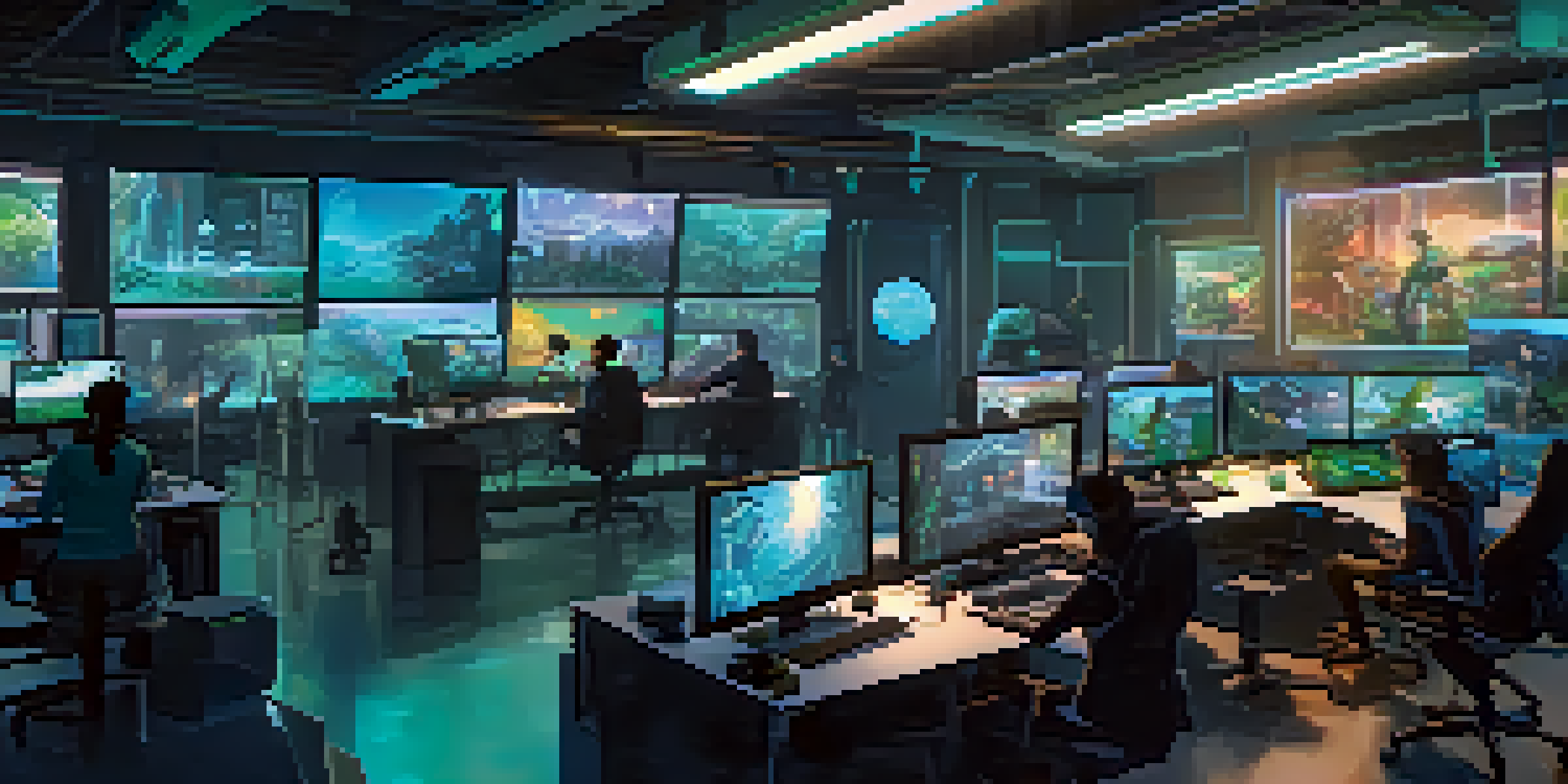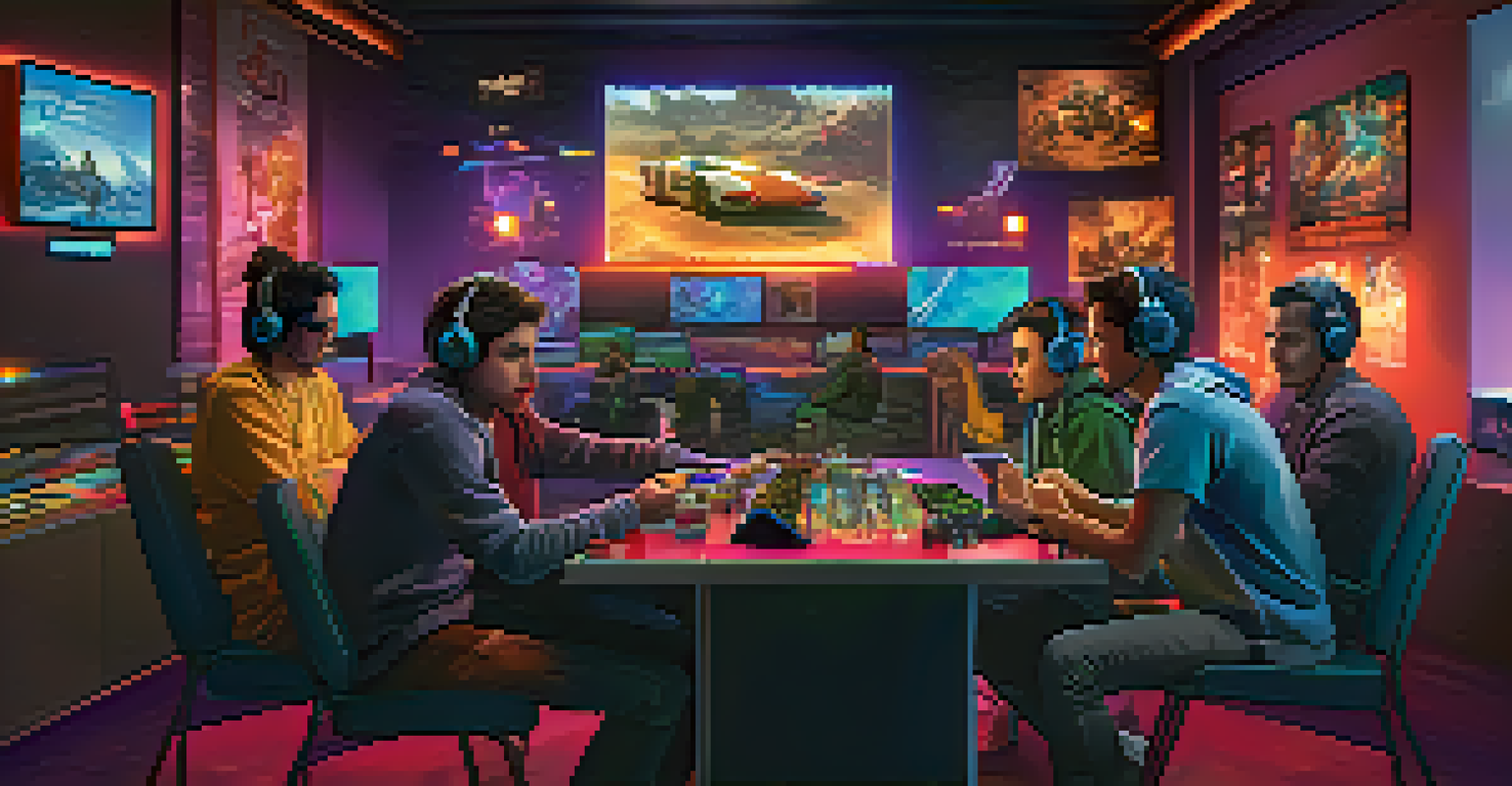The Impact of AI on Game Design and Player Experience

Understanding AI's Role in Modern Game Development
Artificial Intelligence (AI) has become an integral part of game development. It enables developers to create more immersive and interactive gaming experiences. By simulating intelligent behavior, AI can enhance the realism of characters and environments, making games feel more alive.
Artificial intelligence is the new electricity.
For instance, AI can analyze player behavior and adapt gameplay accordingly, offering a unique experience for each player. This not only keeps players engaged but also encourages them to explore different strategies and approaches. As games become more complex, AI is essential for managing the vast amount of data involved.
Ultimately, the integration of AI in game design allows for more dynamic storytelling and character development. Players can interact with characters that respond intelligently to their actions, leading to richer narratives and deeper emotional connections.
Improving NPC Behavior with AI Technologies
Non-player characters (NPCs) have traditionally followed predictable patterns, often making gameplay feel repetitive. However, AI technologies have transformed NPC behavior, allowing them to react to players in more realistic and unpredictable ways. This change enhances the overall gaming experience.

For example, AI-driven NPCs can learn from player actions and adapt their strategies in real-time. This means that a player who relies on a specific tactic may find that NPCs start to counter those moves effectively. Such adaptability makes gameplay more challenging and engaging.
AI Enhances Game Realism
Artificial Intelligence improves the realism of characters and environments, making games more immersive and engaging.
Moreover, with advanced AI, NPCs can exhibit emotional responses and complex dialogue, creating a more immersive world. Players may find themselves forming connections with these characters, as they feel more like real individuals rather than mere programmed entities.
Personalized Gaming Experiences Through AI
One of the most exciting impacts of AI in gaming is the ability to create personalized experiences for players. By analyzing data such as player preferences and past behaviors, AI can tailor gameplay to suit individual tastes. This personalization enhances player satisfaction and retention.
The future of gaming is not just about technology; it's about using technology to create a better experience for players.
For instance, AI can modify difficulty levels or suggest specific quests based on a player's skill level and interests. This ensures that every player has a unique journey, fostering a sense of ownership and connection to the game. Players are more likely to return when they feel the game understands and caters to them.
Additionally, AI can curate in-game content, recommending items or experiences that align with a player's style. This level of customization encourages exploration and investment in the game world, creating a more fulfilling and engaging experience overall.
AI's Role in Game Testing and Quality Assurance
Game testing is a critical phase in development, and AI is revolutionizing this process. Traditionally, human testers would spend countless hours identifying bugs and gameplay issues. Now, AI can automate many of these tasks, significantly speeding up the testing process.
With machine learning algorithms, AI can simulate player behavior and identify potential problems much faster than human testers. This allows developers to catch issues early in the development cycle, improving the overall quality of the game before its release.
Personalized Player Experiences
AI tailors gameplay based on individual player preferences and behaviors, enhancing satisfaction and retention.
Furthermore, AI can provide insights into player experience by analyzing feedback and gameplay data. This data-driven approach helps developers understand player needs and refine the game accordingly, ensuring a smoother launch and a more polished final product.
Enhancing Graphics and Visuals with AI
AI is making waves in the realm of graphics and visual design in gaming. With techniques like neural networks, developers can create stunning visuals that were once thought impossible. AI can enhance textures, generate realistic environments, and even animate characters in ways that captivate players.
For example, AI can analyze and upscale lower-resolution images, improving their clarity without losing detail. This technology allows games to look better on various platforms, providing a more consistent visual experience. As a result, players enjoy richer and more detailed graphics.
Moreover, AI can streamline the art creation process, allowing artists to focus on creativity rather than repetitive tasks. This collaboration between human creativity and AI efficiency leads to visually striking games that leave a lasting impression on players.
AI and the Future of Multiplayer Gaming
The future of multiplayer gaming is being shaped significantly by AI advancements. With AI's ability to analyze player interactions in real time, developers can create more balanced and fair multiplayer environments. This ensures that gameplay remains competitive and enjoyable for all participants.
AI can also facilitate matchmaking by evaluating player skills and preferences, pairing them with suitable opponents. This personalized approach enhances the multiplayer experience, as players face challenges tailored to their skill levels. It leads to more engaging and satisfying matches.
AI Revolutionizes Game Testing
AI automates game testing processes, allowing for faster identification of bugs and improving overall game quality.
Additionally, AI can monitor online behavior, helping to identify and mitigate toxic interactions within gaming communities. This proactive approach fosters a healthier gaming environment, encouraging players to collaborate and enjoy their experiences together.
Ethical Considerations in AI-Driven Gaming
As we embrace AI in gaming, it’s essential to consider the ethical implications that come with it. Issues such as data privacy, player manipulation, and the potential for addiction raise important questions for developers and players alike. It's crucial to navigate these challenges responsibly.
For instance, AI's capacity to collect and analyze player data can lead to improved experiences, but it also raises concerns about how that data is used. Transparency and consent are vital to ensure players feel secure while enjoying personalized content.

Moreover, developers must be mindful of creating engaging gameplay without crossing the line into exploitative practices. Striking a balance between enhancing player experiences and maintaining ethical standards will be key as AI continues to evolve in the gaming industry.